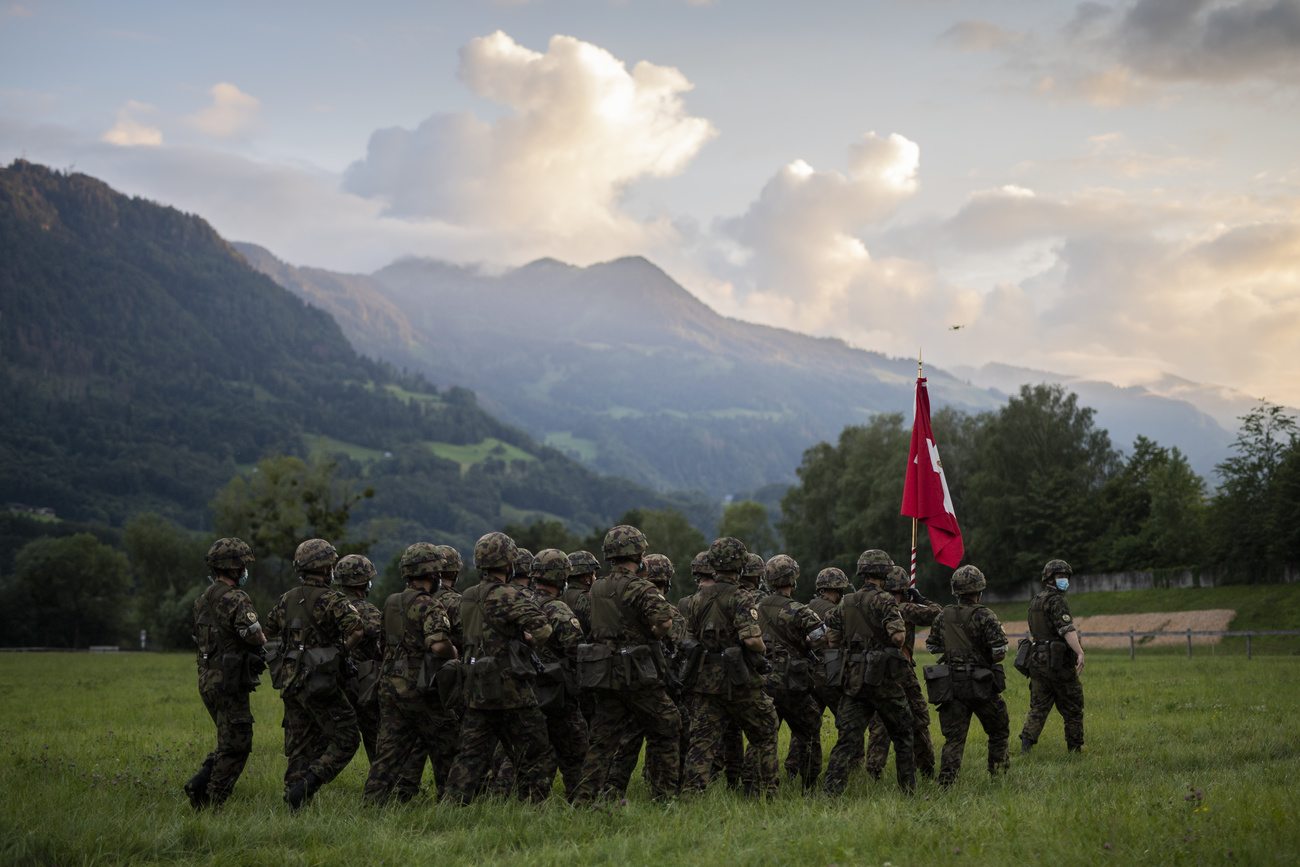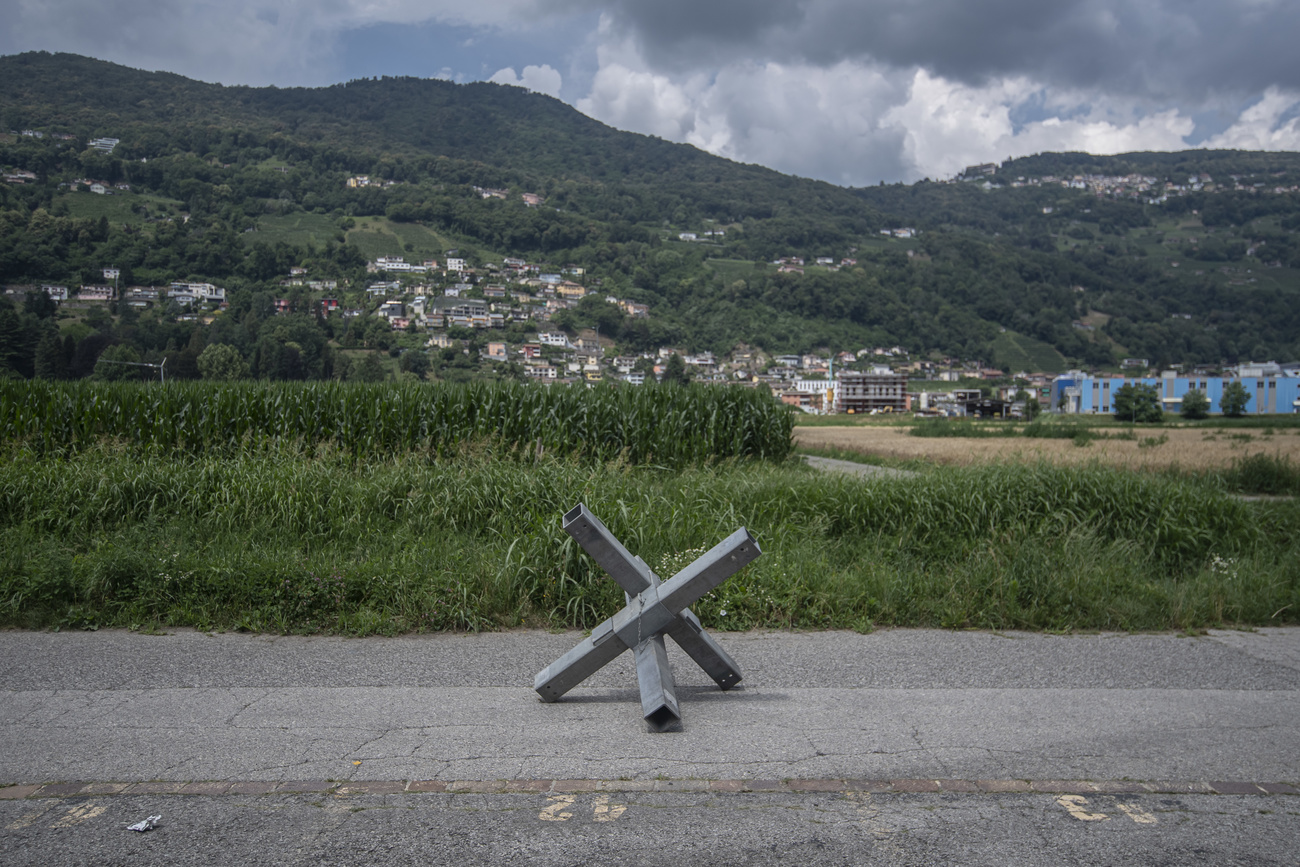
‘There’s a natural interest in cooperation between NATO and Switzerland’

Switzerland wants to work more closely with the transatlantic military alliance NATO. The Swiss state secretary for security policy, Markus Mäder, explains why this is in the interest of all sides.
This year saw the creation of a new entity inside the Swiss defence ministry – the State Secretariat for Security Policy, led by Markus Mäder. The historian and army brigadier was the highest-ranking Swiss official taking part in the Munich Security Conference last weekend. SWI swissinfo.ch spoke to him in the southern German city.
SWI swissinfo.ch: The Swiss government would like to have closer links to NATO and the military structures of the European Union. What does this mean?
Markus Mäder: We want to strengthen the dialogue on security policy with NATO. In particular, we’d like to further strengthen interoperability – that is, the ability of the Swiss army to work together with others – so we’re in a position to have better coordination with neighbouring states, whatever the situation may be. If the situation escalates and political leaders decide to continue working together on defence, then we would have the pre-requisites to do this.
In this respect, I would prefer to characterise it as a deepening of existing cooperation with NATO.

SWI: How is that also in the interest of NATO? What does Switzerland have to offer?
M.M.: NATO is not a nebulous or anonymous entity. It’s made up of states that are our neighbours for the most part – states that share our values and with which we work together closely on many other policy issues. In this respect there’s a natural interest from both sides to cooperate, including on security and defence.
It’s also in the basic interest of our neighbours for Switzerland to ensure there is no security vacuum in the middle of Europe – at the heart of NATO and the EU. In other words, that we have a responsible security policy. This also means that Switzerland must have a credible, strong and reliable army that’s in a position to cooperate when both sides want it to.
We can also provide a lot of expertise – on the air force, NBC protection [measures to defend against nuclear, biological and chemical threats] or the disposal of explosive ordnance. We already have effective cooperation at an operational level on training, and exchanges of information and experiences. So, I think there’s also an interest among NATO and its member states to intensify cooperation.
SWI: Ireland and Malta, which like Switzerland are neutral states, are also working more closely with NATO. Is it correct to say there’s a general trend in neutral countries of inching closer to NATO?
M.M.: Everyone in Europe realises that there’s a real threat that goes beyond the war in Ukraine. The foundations of Europe’s peace and security order have been shaken by Russia’s invasion that violates international law. That concerns all of us.
So, the neutral countries of Europe have probably concluded that even more cooperation is necessary. Evidently, I can’t speak for others, but they are following the same logic as we are: threats are growing, and they want to strengthen their own defence capabilities and at the same time deepen cooperation.

More
Explainer: Russia pushes Europe’s neutral states closer to NATO
SWI: Is there now more pressure on neutral states? Christoph Heusgen, director of the Munich Security Conference, would like Switzerland to ‘do more, directly or indirectly’, in relation to getting more ammunition to Ukraine.
M.M.: The pressure hasn’t increased but it is still there. Each country has its own history, its own policy. The important thing is for our European partners to see how Switzerland is trying to adjust where necessary. The Swiss parliament is currently looking at whether it’s possible to make the law on war materiel more flexible. For that we need to have some patience, as in every democracy
SWI: Switzerland is often accused of being a free-rider when it comes to security. It’s not represented at the ministerial level at the Munich conference, where the most important security questions are being discussed. Is that a bad sign?
M.M.: The Swiss president, Viola Amherd, had several important meetings in Bern this week [including one on the army budget] and next week we have a detailed consultation on the legislative plan. She’ll be taking part in this on behalf of the government. She’s already met with heads of state and defence ministers at the World Economic Forum (WEF) [in Davos in January] and during visits abroad. I’m sure other countries understand this. In recent years we’ve always sent a minister [to Munich] and I’m convinced that this will be the case again in the future.
SWI: What were your conversations in Munich about? Did you bring up the Ukraine peace conference that Switzerland is planning?
M.M.: Basically, they were about what we can gain from such an event for our own security interests. I also started to build my own network. Munich is a good opportunity to make contacts, but it’s less conducive to deep, hours-long discussions.
SWI: The Munich Security Report 2024 talks of a growing pessimism in the West. What did you make of the mood at the conference?
M.M.: One of the speakers said there was lots of optimism last year – maybe even too much. And this year, there’s a lot of pessimism, and maybe even too much of it.
We have to be realistic: the current challenges and threats we’re facing can’t be overcome within a short time. It will take perseverance, cooperation and unity to defend international law and all the principles connected to it. For this, of course, the so-called Global South is important – the rules-based world order depends on all countries being bound to it. Switzerland is committed to this.
SWI: You’re heading up the new state secretariat for security policy. Why do we need such an entity?
M.M.: The security policy challenges are becoming more complex, unpredictable and volatile. So, we have to position ourselves accordingly.
The task of the state secretariat is to come up with coherent concepts for a holistic and forward-thinking security policy and, at the same time, provide better coordination of existing instruments. Incidentally this was of great interest to our discussion partners abroad.
SWI: So, security policy is also becoming more important for Switzerland…
M.M.: Absolutely. Generally speaking, the geopolitical situation has become more challenging, and this has an impact on Switzerland too. We’re responding to this in two ways. One is to strengthen our defence capability, especially our army. And the other is to intensify our cooperation with our natural security policy partners. And that’s primarily Europe.

More
In Munich, world leaders attempt dialogue on shaky foundations
Edited by Mark Livingston. Adapted from German by Geraldine Wong Sak Hoi

In compliance with the JTI standards
More: SWI swissinfo.ch certified by the Journalism Trust Initiative
































You can find an overview of ongoing debates with our journalists here . Please join us!
If you want to start a conversation about a topic raised in this article or want to report factual errors, email us at english@swissinfo.ch.